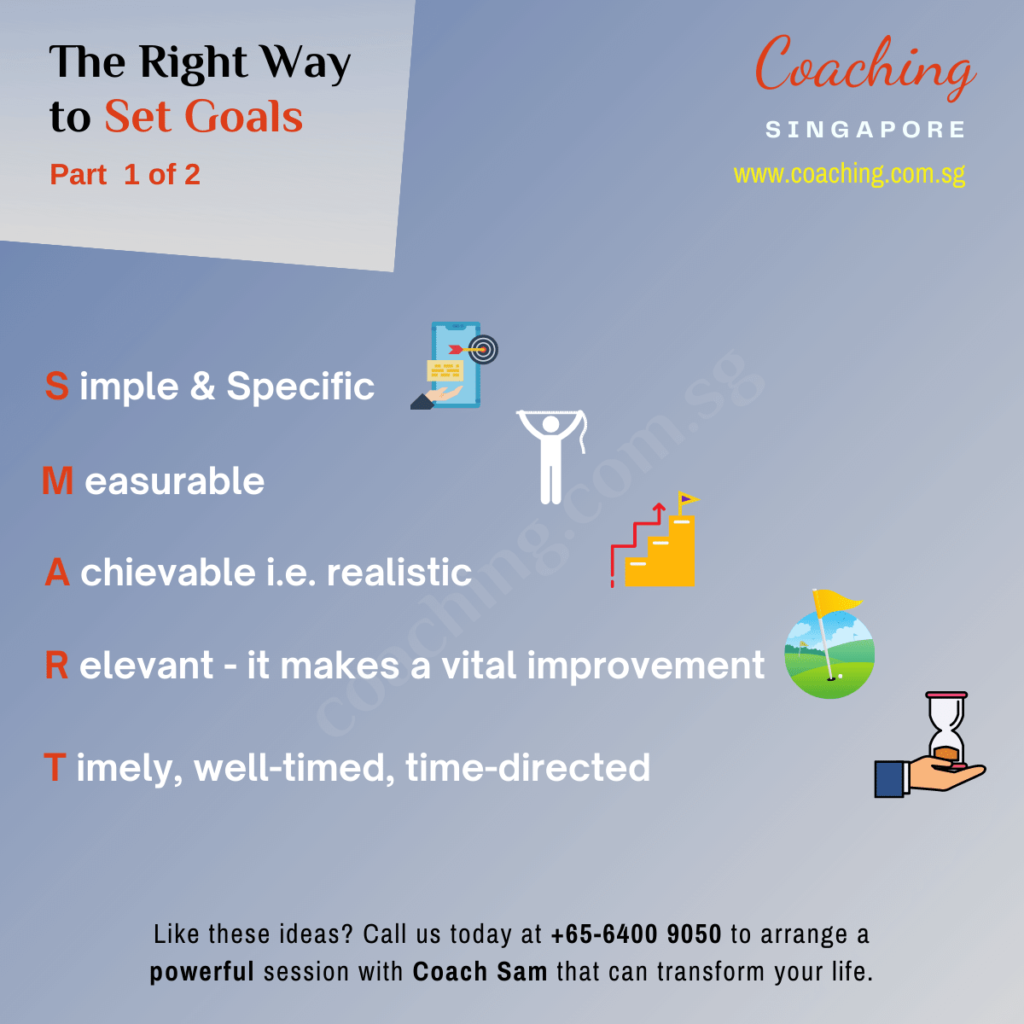Home » Mental Resilience » How to set goals the right way – A guide to help you win your battles
How to set goals the right way - A guide to help you win your battles

- Author: Coach Sam
Goals maketh man.
We are our intentions, our direction, our destination. We are also on our journey to that end result.
A goal is a vision for the future – near or far. It is the desired outcome of our actions.
There are long-term and short-term goals. There are important, critical goals and light, fun goals.
It is an art and a science, and unique to our personalities.
Finally, well-chosen goals are great motivators, not burdens.
“People with goals succeed because they know where they are going” – Earl Nightingale
1. Simple, specific
What exactly do you want to achieve?
The more specific your description, the bigger the chance you’ll get exactly that.
S.M.A.R.T. goal setting clarifies the difference between ‘I want to be a millionaire’ and ‘I want to make $10,000,000 in my bank account within the next five years by raising capital, hiring a team, and creating a new software product for the grocery supply industry’.
Questions you may ask yourself when setting your goals and objectives are:
- What exactly do I want to achieve?
- Where?
- How?
- When?
- With whom?
- What are the conditions and limitations?
- Why exactly do I want to reach this goal?
- What are possible alternative ways of achieving the same?
2. Measurable
“What can be measured, can be managed” as the oft-used management saying goes.
And it is quite logical. Measurable means quantifiably comparable to something else.
Measurable goals are those where the phases and state of progress are clearly discernible.
It is true that some milestones defy quantification – for example how we look or feel, what is our social standing or respect amongst co-workers and family.
An example of an unquantified goal is to get to a healthy weight.
As worthy as that above goal is, it becomes measurable only when we aim to lose 1.5 pounds a week for 6 months by skipping breakfast or dinner.
Another measurable goal (versus simply wanting to become rich) is to make two extra sales calls each day, or 40 extra calls a month to new prospects who are referred by existing clients in order to increase your income by 20% in 3 months.
Measurable goals help us stay motivated and calibrated.
Defining the physical manifestations of your goal or objective makes it clearer, and easier to reach.
3. Achievable i.e. realistic
Is your goal attainable – probable, likely, logical – given what is needed and what you have for it at your disposal?
You weigh the effort, time, and other costs your goal will take against the profits and the other obligations and priorities you have in life.
If you don’t have all the resources NEEDED – be it time, money, or talent to reach a certain goal you’ll likely fail at achieving your goal.
And every failure – especially the avoidable or unnecessary ones – comes with a cost.
That doesn’t mean that you can’t take something that seems impossible and make it happen by planning smartly and going for it!
An example I love to quote for this is constructing a tower or skyscraper.
That is a very achievable vision. A lot of people – entrepreneurs, teams, organizations – around the world have done it.
But to do it realistically, one needs all the right plans, people, capital, and tools.
Without those resources, building even a small villa can be undoable.
4. Relevant
By relevant, I mean the goal makes a vital improvement
This is the big WHY. What is the purpose of this goal?
What difference does reaching this goal make? Does that difference make your life significantly better?
This aspect helps us decide whether a goal is WORTH the sacrifices, or investment, or risk that it entails.
You decide for yourself whether you have the personality for it, or your team has the bandwidth.
If you’re lacking certain skills, you can plan training. If you lack certain resources, you can look for ways of getting them.
The answer to your WHY will help you stay motivated.

5. Timely, well-timed, time-directed
“Time is money” the saying goes.
It is the only unrecoverable resource we have.
Timelines (and in some cases, deadlines) are usually what makes people switch gears in action.
The best timelines are natural.
By that, I mean there is a very real event that is going to occur in the near future – with significant consequences that depend on our actions – that we need to be prepared for.
This could be a standardized exam, or an upcoming trip faraway, or a presentation to clients.
In special situations, allow some flexibility as needed.
That way you can keep morale high, and the process of achieving goals fun.
When we say “timely”, we are referring to setting and achieving well-selected goals at the right time in the grand scheme of things.
An example of this would be taking up certain courses in preparation for a new career in an emerging industry, or working on a financial plan that ensures stability for having children.
6. Well-selected goals – choose your battles carefully
When you set goals for yourself, it is important that they motivate you.
The easiest way to do this is making sure that the outcomes are important to you – that you see personal value in achieving them.
The risk/reward ratio of the goal – is it worth it?
If you have little interest in the outcome, or they are irrelevant given the larger picture, then the chances of you putting in the work to make them happen are slim.
Motivation is key to achieving big goals, by completing each step the preparation needed.
For example, if you are trying to rise up on the career ladder i.e. get the right promotions, and in a meeting, a peer makes remarks that agitate you, should you try to win over your colleague then and there, making a scene?
Or should you ignore it so that you protect your larger image in the eyes of others who you intend to lead?
In general, set goals that relate to the highest priorities in your life.
Without this type of focus, you can end up with far too many goals, leaving you too little time to devote to each one.
Though sometimes, you may want to set some “small” goals in “not so serious” aspects.
This is so that you can get yourself used to achieving victory and/or taking on insignificant risks i.e. trying out fresh ideas for fun.
The subconscious lessons we learn from these “side hustles” are like what vaccines do for our immune systems.
Goal achievement requires commitment.
To maximize the likelihood of success, you need to feel a sense of urgency as well as the excitement of victory.
The ideal situation is to have a natural “I must do this” attitude about the mission.
7. How challenging is it / needs to be?
Warren Buffett, the great investor says – “I don’t look to leap over 7-foot bars: I look around for 1-foot bars that I can step over.”
The definition of “the right targets” and the way the evaluation of results is performed affects the willingness to commit to new challenges, which is a factor that influences the relationship between goal setting and performance results.
Indeed, some research papers claim that the choice of an inappropriate goal-setting procedure is a major cause of the failure of management control systems.
Goal setting theorists found that assigning a specific and challenging goal leads to higher performance than
(a) an easy goal,
(b) a general goal, or
(c) no goal setting.
Begin with the end in mind.
Goals that stretch us in the right way can cause some amount of stress in the process.
That is why it is vital for us to know the difference between distress and eustress.
Distress is the harmful tension that can cause more damage than good.
It places us in a state of scramble and chaos.
We feel we have bitten off more than we can chew.
This is unwise for both individuals and organizations.
Eustress on the other hand is a wonderful state of transformation that sometimes needs us to be out of our comfort zone.
It is the healthy pain we may feel in the gym as we near our final repetitions of the workout.
It is the pressure we put upon ourselves when we want to ace an exam, just for our own self-validation.
8. Knowing when to abandon a goal
Consider abandoning a goal when:
- The burning reason why you wanted to achieve the goal is now irrelevant
- The cost of achieving it has, or will, far exceed the benefits
- It has caused significant pain to you or those important to you
This is absolutely not to say that you should stop trying to achieve your goals because they are hard.
Don’t use this reason as an excuse.

Conclusion:
I trust some of the principles of goal setting above will act as a gentle reminder for moving ahead in your life.
Let me end with the words of Microsoft CEO Satya Nadella – “Believe in yourself more than you think you do”.
Comment: Is there any hack that helps you to crush your goals that were not covered in this blog?
Let me know in the comment section below, I would love to learn from you & hear your stories.
Share This Post, Choose Your Platform!
